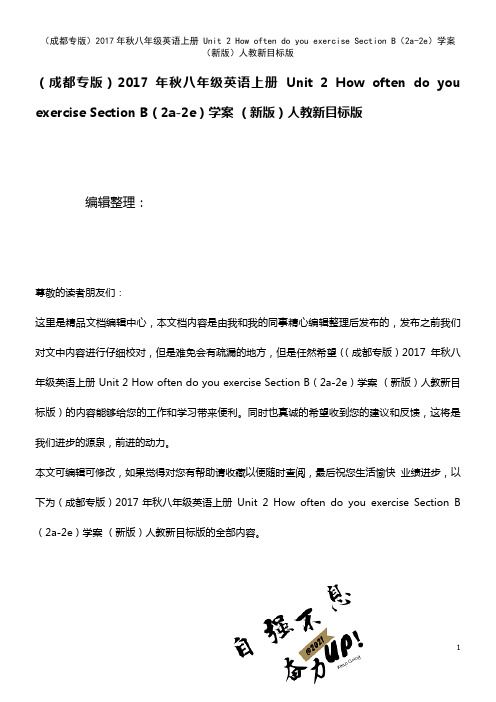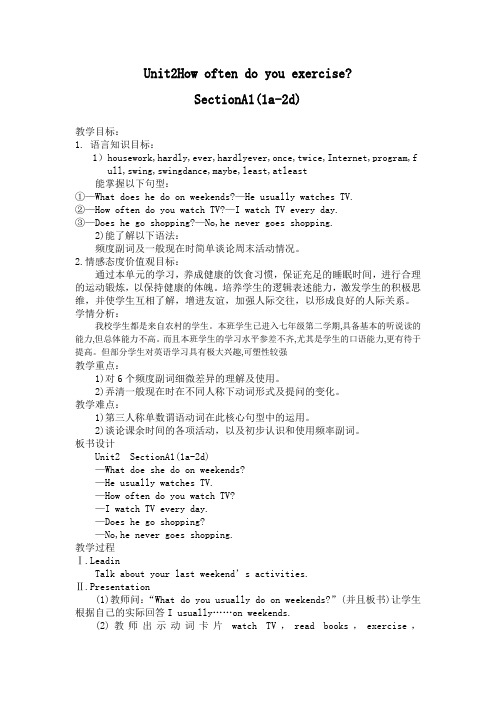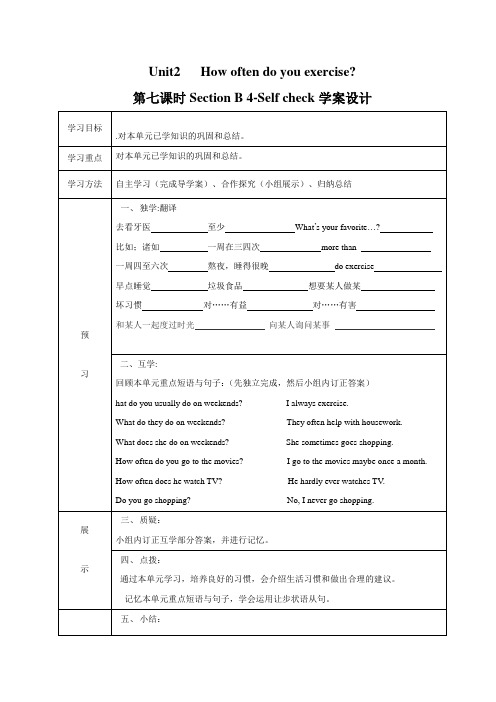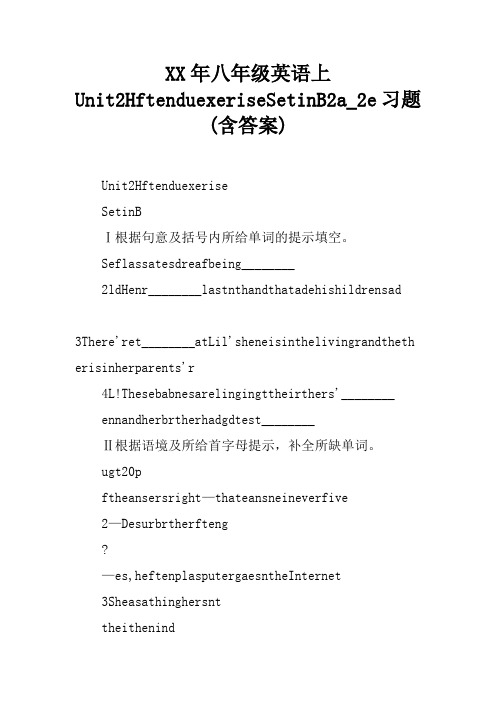2017年四川省宜宾县双龙镇初级中学校八年级英语上册 Unit 2 How often do you exercise Section B 2a2b2c2d
- 格式:doc
- 大小:80.50 KB
- 文档页数:2

(成都专版)2017年秋八年级英语上册Unit 2 How often do you exercise Section B(2a-2e)学案(新版)人教新目标版编辑整理:尊敬的读者朋友们:这里是精品文档编辑中心,本文档内容是由我和我的同事精心编辑整理后发布的,发布之前我们对文中内容进行仔细校对,但是难免会有疏漏的地方,但是任然希望((成都专版)2017年秋八年级英语上册 Unit 2 How often do you exercise Section B(2a-2e)学案(新版)人教新目标版)的内容能够给您的工作和学习带来便利。
同时也真诚的希望收到您的建议和反馈,这将是我们进步的源泉,前进的动力。
本文可编辑可修改,如果觉得对您有帮助请收藏以便随时查阅,最后祝您生活愉快业绩进步,以下为(成都专版)2017年秋八年级英语上册Unit 2 How often do you exercise Section B (2a-2e)学案(新版)人教新目标版的全部内容。
Unit 2 How often do you exercise第四课时Section B (2a~2e)【学习目标】1.学生能掌握本课时的核心重点单词和短语,读懂介绍别人课余活动的文章。
2.学生能根据所学内容,用英语口头表达自己的课余生活。
3.学生能通过开展小组活动学习,掌握阅读方法,提升自己的阅读技能。
【学习重点】学会并掌握阅读技巧,掌握not…at all等重点短语的用法。
【学习难点】通过阅读训练和交流,了解如何描述自己的生活习惯Learning action tips:This is an article about a survey of daily life。
Teacher can prepare a few questions, then invite some students to answer these questions.Task 1Learning action tips:Preview the words on Page13-14 in the word list。
2017-2018学年八年级英语上册 Unit 2 How oft](https://img.taocdn.com/s1/m/060d7ff928ea81c758f578b3.png)
Unit 2 How often do you exercise第三课时Section B(1a~1e), 01 听力训练Ⅰ.听短对话,选择正确的答案。
每段对话读两遍。
(B)1.What does Sam usually do on weekends?A.Go shopping. B.Play sports.C.Visit his friends.(C)2.How often does Gina watch TV?A.Every day. B.Never.C.Once a week.(C)3.What food does Kate like?A.Vegetables. B.Junk food.C.Vegetables and fruit.(A)4.How many hours does Bill sleep?A.Nine hours. B.Ten hours.C.Over ten hours.(A)5.What doesn't John have for breakfast?A.Milk. B.An egg.C.Bread.Ⅱ.听长对话,选择正确的答案。
每段对话读两遍。
听第一段对话,回答第6—7小题。
(A)6.What does Li Lei usually do on Saturday?A.He usually goes to the library.B.He usually goes to the museum.C.He usually stays at home.(C)7.How often does Li Lei watch TV?A.Sometimes. B.Never.C.Hardly ever.听第二段对话,回答第8—10小题。
(A)8.What are the speakers doing now?A.Making a call. B.Doing housework.C.Playing chess.(B)9.How often does Mark help his father wash the car? A.Twice a month. B.Once a week.C.Once a day.(A)10.What day is it today?A.Friday. B.Saturday.C.Sunday.Ⅲ.听短文,选择正确的答案。
![[人教版]四川省宜宾县双龙镇初级中学校八年级英语上册《Unit2HowoftendoyouexerciseSectionB3a_Selfcheck》](https://img.taocdn.com/s1/m/4a5aace784868762caaed596.png)
【学习目标】1、复习、巩固、运用本单元所学内容。
2、学生能用频度副词来表达自己做事的好习惯和坏习惯。
【自主学习】学生预习P15、16的内容,(独立完成下列各题. 完成后对子间相互批阅)。
一、找出下列短语1、帮忙做家务________2、熬夜________3、去看牙医___________4、16岁的______5、许多好习惯____________6、然而______7、超过两小时______8、在晚上________二、完成3a三、先回答3b,根据3b的答案,写一篇关于你的好习惯和坏习惯的报告。
___________________________________________________________________________________________________________________________________________________________________________________________________________________________________________________________________________【合作探究】探究1. 频率副词的用法。
always,usually,often,sometimes,hardly ever ,never都是表示事情发生频率的副词,也是不准确地说某事在一段时间内发生的次数。
我们按照频率发生的高低,可以将这几个词排列为always > usually > often > sometimes > hardly ever > never。
【针对练习】①他通常骑自行车上学。
He _________ goes to school by bike.②他经常上学迟到。
He is ___________ late for school.③有时候他骑自行车上班,有时候他乘公共汽车上班。

Unit2How often do you exercise?SectionA1(1a-2d)教学目标:1.语言知识目标:1)housework,hardly,ever,hardlyever,once,twice,Internet,program,f ull,swing,swingdance,maybe,least,atleast能掌握以下句型:①—What does he do on weekends?—He usually watches TV.②—How often do you watch TV?—I watch TV every day.③—Does he go shopping?—No,he never goes shopping.2)能了解以下语法:频度副词及一般现在时简单谈论周末活动情况。
2.情感态度价值观目标:通过本单元的学习,养成健康的饮食习惯,保证充足的睡眠时间,进行合理的运动锻炼,以保持健康的体魄。
培养学生的逻辑表述能力,激发学生的积极思维,并使学生互相了解,增进友谊,加强人际交往,以形成良好的人际关系。
学情分析:我校学生都是来自农村的学生。
本班学生已进入七年级第二学期,具备基本的听说读的能力,但总体能力不高。
而且本班学生的学习水平参差不齐,尤其是学生的口语能力,更有待于提高。
但部分学生对英语学习具有极大兴趣,可塑性较强教学重点:1)对6个频度副词细微差异的理解及使用。
2)弄清一般现在时在不同人称下动词形式及提问的变化。
教学难点:1)第三人称单数谓语动词在此核心句型中的运用。
2)谈论课余时间的各项活动,以及初步认识和使用频率副词。
板书设计Unit2 SectionA1(1a-2d)—What doe she do on weekends?—He usually watches TV.—How often do you watch TV?—I watch TV every day.—Does he go shopping?—No,he never goes shopping.教学过程Ⅰ.LeadinTalk about your last weekend’s activities.Ⅱ.Presentation(1)教师问:“What do you usually do on weekends?”(并且板书)让学生根据自己的实际回答I usually……on weekends.(2)教师出示动词卡片watch TV,read books,exercise,swim ,playfootball、goshopping、go to the movies让学生回答。


Unit 2 How often do you exercise Section B 2a、2b、2c、2d、2e 【学习目标】1、学生能掌握percent, although, though, such as等重点词汇的运用。
2、学生能掌握句型:Old habits die hard. Here are…引导的倒装句;although引导的让步状语从句; It’s good to do sth…【自主学习】预习P13/14的内容,完成下列任务,(关上课本独立完成,完成后对子间相互批阅)。
一、找出下列短语)1.玩电脑游戏_________2. 去野营_________3. 空闲时间_________4. 百分之十五_________5. 一周四到六次_________6. 一周三或四次_________7. 一点也不_________ 8. 上网_________ 9. 我们问题的答案_________10. 放松的最好方式_________ 11. 例如_________ 12. 共度时光_________二、阅读文章,完成饼图、2c、2d.【合作探究】1:Here are the results. 这是一个倒装句。
在英语中here, there放在句首时,句子通常用倒装语序。
例如:He re are the results of the math exam.【针对训练】Here________ the bus. (公共汽车来了)2:percent意为“百分之……”,没有复数形式,“数词+percent of+名词”意为“……当中的百分之多少”,作主语时,用它所修饰的名词来判断谓语的单复数。
如:Only fifteen percent of our students exercise every day.【针对训练】Sixty percent of students _________(be) 16 years old.3:Although many students like to watch sports, game shows are the most popular. although连词,意为“即使,纵然,虽然”,相当于though,在同一个句子中,although/though 不能与but 连用。
XX八年级上册英语Unit 2单词表汇总
(新人教版)
XX八年级上册英语Unit2单词表汇总(新人教版)
八上Unit2
huser家务劳动;家务事
hardl几乎不;几乎没有
ever在任何时候;从不;曾经
hardlever几乎从不
ne一次;曾经
tie两次;两倍
Internet互联网;因特网
prgra节目
full忙的;满的;充满的
sing摆动;秋千;摆动;摇摆
singdane摇摆舞
abe大概;或许;可能
least最小;最少;最小的;最少的
atleast至少;不少于;起码
un无用的东西;无价值的东西
unfd垃圾食品
ffee咖啡
health健康;人的身体;状态
result结果;后果
perent百分之…
nline在线;联网
televisin电视节目;电视机althugh虽然;尽管;即使thrugh以;凭借;穿过
ind头脑;心智
bd身体
suh这样的;那样的;类似的suhas例如;像…这样
tgether在一起;共同
die消失;灭亡;死亡
riter作者;作家
dentist牙科医生
agazine杂志;期刊
hever然而;不过
than比
rethan多于
alst几乎;差不多
nne没有一个;毫无
less较少;较小;较少的;更少的lessthan少于
pint得分;点。
Unit 2 How often do you exercise?Section A1 (1a-2c)教学设计【学习目标】1. 理解并掌握下列词汇及短语:Key words:housework,hardly,ever,once,twice,Internet,program.Key phrases:how often,on weekends,go to the movies,help with housework,hardly ever,go shopping,once/twice a week/a month,use the Internet.2. 理解并掌握下列重点句子:1) What do you usually do on weekends?I often go to the movies.2) How often do you watch TV?I watch TV every day.3.重点语法:1) 灵活运用以what 开头的一般现在时的特殊疑问句。
2) 用how often 对动作频率进行提问,并掌握其答语。
4. 通过学习,培养健康意识及良好的生活习惯。
【重点和难点】1. The adverbs of frequency:always,usually,often,sometimes,hardly ever,never2. To be able to talk about how often you do things.【教学过程】Ⅰ. Lead-in1.Enjoy a song:Weekends2.Questions:What do people usually do on weekends?Ⅱ. Presentation1.Show some pictures on the big screen. Let Ss read the expressions.Exercise=do sports;go to the movies;watch TV;use the Internet;go shopping=shop=do some shopping;read books=read=do some reading;help with housework=help sb( to) do housework2.Quick response:Review the phrases3.Pairwork:Work with your partner.Choose.Ask and answer.4.Now, look at the picture in 1a. Make a list of the weekend activities.Answers: 1. help with housework 2. watch TV 3. exercise 4.read a book 5. go shopping5.New drills:Learn Adverbs of frequencyShow some pictures and make conversations:1)A:Do you do homework on weekends?B: Yes,I always do homework.2)A:Does she watch TV on weekends?B: Yes,she usually watches TV.3)A:Does he use the Internet on weekends?B: Yes,he often uses the Internet.4)A:Do they exercise on weekends?B: Yes,they sometimes exercise.5)A:Does she help with housework on weekends?B: Yes, but she hardly ever helps with housework.6)A:Does he go fishing on weekends?B: No,he never goes fishing.6.Practice:Make sentences like this:On weekends,I always do some housework.I usually use the Internet.I often do some reading.Sometimes I go shopping.I hardly ever exercise.I never go to the movies.III. Listening1. Read the expressions in 1b2. Play the recording the first time.Write the activities next to the correct frequency words.Check the answers.3.Play the recording a second time. Listen to conversation again and complete. Reporter: _____________________ on weekends?Girl 1: I _________ go shopping.Boy 1: I ______ go shopping. I _______ watch TV.Boy 2: I _______ exercise.Girl 2: I _____ help with __________.Reporter: How about you?Girl 3: I ___________ watch TV. I ______ read.Reporter: Oh, __________?Girl 3: Oh, I don’t know. I guess I just like books.4.Watch the video.5.Listen again and repeat.Then role play.IV.Pair work1. Point out the sample conversation. Ask two Ss to read the conversation to the class.2. Now work with a partner. Make your own conversation about the people in the picture.3. Ss work in pairs. As they talk, move around the classroom and give any help they need.4. Let some pairs act out their conversations.V. Consolidation1.Present the key sentence:How often do you do these activities?Language point:how often 多久一次,对频率进行提问。
Unit 2 How often do you exercise Section B 2a、2b、2c、2d、2e 【学习目标】
1、学生能掌握percent, although, though, such as等重点词汇的运用。
2、学生能掌握句型:Old habits die hard. Here are…引导的倒装句;although引导的让步状语从句; It’s good to do sth…
【自主学习】
预习P13/14的内容,完成下列任务,(关上课本独立完成,完成后对子间相互批阅)。
一、找出下列短语)
1.玩电脑游戏_________
2. 去野营_________
3. 空闲时间_________
4. 百分之十五_________
5. 一周四到六次_________
6. 一周三或四次_________
7. 一点也不_________ 8. 上网_________ 9. 我们问题的答案_________
10. 放松的最好方式_________ 11. 例如_________ 12. 共度时光_________
二、阅读文章,完成饼图、2c、2d.
【合作探究】
1:Here are the results. 这是一个倒装句。
在英语中here, there放在句首时,句子通常用倒装语序。
例如:He re are the results of the math exam.
【针对训练】Here________ the bus. (公共汽车来了)
2:percent意为“百分之……”,没有复数形式,“数词+percent of+名词”意为“……当中的百分之多少”,作主语时,用它所修饰的名词来判断谓语的单复数。
如:Only fifteen percent of our students exercise every day.
【针对训练】Sixty percent of students _________(be) 16 years old.
3:Although many students like to watch sports, game shows are the most popular. although连词,意为“即使,纵然,虽然”,相当于though,在同一个句子中,although/though 不能与but 连用。
例如:Although/though he is very tired, he doesn’t have a rest.【针对练习】_________they are brothers, they don’t look like each other at all. 4:辨析interesting/interested. Interesting译为______,主语通常是____, interested译为_______,主语通常是____,如:This film is very______ ,so I am_____ in it.
5、辨析such as/for example.
for example作“例如”讲时,一般只以同类事物或人中的“一个”为例,后面要用逗号隔开,可置于句首、句中或句末。
如:He,for example,is a good student. ___ ______(例如),air is invisible.
such as用来列举同类人或物中的几个例子,可置于被列举的事物与前面的名词之间,但其后边不能用逗号。
如:Boys such as John and James are very friendly.像约翰和詹姆斯这样的男孩都很友好。
【针对练习】I like drinks _____ _____ (例如)tea and milk.
【小组展示】
1、大声、正确的朗读2b的文章,注意语音语调,并能说出其意思。
2、合作探究的成果。
随堂笔记(教师指导归纳整理)
__________________________________________________________________________________
【当堂检测反馈】 (关上书本,独立完成。
做完后对子间相互批阅。
)
1、百分之二十的学生根本不锻炼。
Twenty percent of the students _______exercise________ _________.
2、我们认为最好的放松方式是通过锻炼。
We think___ ____ ____ ____ ____ is through exercise.
3、百分之十的学生使用互联网一周至少三或四次。
Ten percent students use the Internet at least ____ ____ ____ ____ ____ ______.
4、旧习难改。
_________________.
【拓展提升】训练方式:独立,自主完成
自评:师评:批阅日期:______
一、基础题:
(一)首字母填空
1. Twenty p__________ of the students play sports after school.
2. Lu Xun is a famous w_____________.
3. What’s your favorite p on TV?
4. How often do you use the I ?
5. Here are the r of the student activity survey at Green High school. (二)翻译
1. 保罗一周打一次或两次篮球。
Paul plays basketball ______ ______ ______ ______ _______ .
2. —你认为放松最好的方法是什么?___ do you think is ___ _____ ____ _____ ________?
3. 百分之九十的学生常常使用电脑。
______ _______ the students always _______ the computer.
4. 看电视的调查结果很有趣。
The ________ __________ “watch TV” are very ____________.
二、发展题:
1. The book is _____. Most of the students are _____ in it.
A. interesting; interesting
B. interested; interested
C. interesting; interested
D. interested; interesting
2.We should do more exercise to keep______.
A. health
B.healthy
C.healthily
D.unhealt hy
3. _______ has your uncle been to Canana? Only twice
A.How many times
B.How often
C.How long
D.How much
4._____ it is raining, _____ he is still working outside.
A. Although; but
B. Although; /
C. But; although
D. /; although
三、提高题
She plays sports every morning.(改为一般疑问句)
__________ she __________ sports every morni ng?
2. She watches TV at least once or twice a week. (就画线部分提问)
_______ _______ does she _______ TV?
3. They often play basketball on Saturdays and Sundays. (改为同义句)
They often play basketball __________ __________.
4. They often sleep for eig ht hours every night.(对画线部分提问)
_______ _______ _______do they sleep every night?
5. Fifteen percent students exercise every day. (对画线部分提问)
_________ _________ students exercise every day?
【自主反思】(写出今日一得和今日不足)
今日一得:
今日不足:。